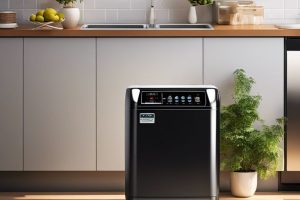Will a 2200 watt generator run a refrigerator?

Curious minds often ponder if a 2200 watt generator possesses the capacity to power a refrigerator during times of need. The answer lies in understanding the power requirements of your specific refrigerator model and the capabilities of the generator in question. Let’s dive into the intricacies of wattage, starting watt requirements, and running watts to determine if a 2200 watt generator is up to the task of keeping your perishables chilled and fresh.
Key Takeaways:
- Minimum Requirement: A 2200 watt generator can typically run a refrigerator as long as the fridge’s starting wattage and running wattage are within the generator’s capacity.
- Check the Specifications: Before connecting your refrigerator to a 2200 watt generator, verify the power requirements of the fridge and ensure it falls within the wattage output of the generator to prevent any damage.
- Consider Other Appliances: If you plan to run other appliances simultaneously with the refrigerator, remember to account for their combined wattage to ensure the 2200 watt generator can power them all efficiently.
Types of Generators and Refrigerators
Obviously, when considering whether a 2200 watt generator can run a refrigerator, it is important to understand the different types of generators and refrigerators available in the market.
| Generator Types | Refrigerator Types |
| – Portable Generators | – Top-Freezer Refrigerators |
| – Standby Generators | – Bottom-Freezer Refrigerators |
| – Inverter Generators | – Side-by-Side Refrigerators |
| – Solar Generators | – French Door Refrigerators |
| – Diesel Generators | – Compact Refrigerators |
Assume that different generators and refrigerators have varying power requirements and capabilities for running appliances efficiently.
Generator Power Classes
Classes of generators are categorized based on their power output, ranging from small portable generators to large standby generators used for backup power in homes and businesses.
It is essential to match the power output of the generator with the power requirements of the appliances it will be running to ensure proper functionality and prevent damage.
Refrigerator Power Consumption Profiles
Consumption profiles of refrigerators can vary depending on the type and size of the refrigerator, as well as the energy efficiency rating of the appliance.
Understanding the power consumption profile of a refrigerator is crucial when determining if a specific generator can effectively power the refrigerator without overloading the system.
Power consumption profiles provide valuable insight into how much power a refrigerator may draw when running continuously or during peak usage periods, helping consumers make informed decisions about generator compatibility.
Factors Affecting Generator and Refrigerator Compatibility
Clearly, when it comes to running a refrigerator on a generator, there are several factors that come into play. Ensuring compatibility between the generator’s power output and the refrigerator’s power requirements is crucial for successful operation.
- Generator Power Output
- Refrigerator Power Requirements
- Starting Watts vs. Running Watts
- Generator Type and Quality
- Electrical Load Management
Perceiving how these factors interact will help you determine whether a 2200 watt generator can effectively run a refrigerator.
Starting and Running Watts Explained
Watts are the unit of measurement for power. Every electrical appliance has two power ratings: starting watts and running watts. Starting watts are the extra power required to start the appliance, while running watts are the power needed to keep it running.
When considering a generator’s capacity to run a refrigerator, you must account for both the starting watts and running watts of the refrigerator to ensure the generator can handle the initial power surge and provide continuous power.
Assessing Your Refrigerator’s Specific Needs
Specifically, to determine if a 2200 watt generator can run your refrigerator, you need to know the starting watts and running watts of your refrigerator model. This information is usually found on the appliance’s label or in the user manual.
Refrigerators with built-in ice makers or other extra features may have higher power requirements, so it’s essential to consider all additional components when calculating the total power needed to run your refrigerator on a generator.
Step-by-Step Guide to Using a 2200 Watt Generator with Your Refrigerator
For individuals seeking to power their refrigerator during a power outage or while off-grid, a 2200 watt generator can be a suitable option. By following a few simple steps, you can safely and effectively run your refrigerator using this generator.
| Preparing Your Generator for Use | Connecting and Starting the Refrigerator |
| Guide | Refrigerator |
Preparing Your Generator for Use
Before connecting your refrigerator to the 2200 watt generator, ensure that the generator is placed in a well-ventilated area outdoors. Check the oil and fuel levels to guarantee the generator’s smooth operation. Make sure to use the appropriate extension cords to connect the refrigerator to the generator.
Next, start the generator following the manufacturer’s instructions. Allow the generator to run for a few minutes to stabilize before plugging in your refrigerator. Confirm that the generator is producing a stable power output before proceeding.
Connecting and Starting the Refrigerator
Once the generator is running smoothly, connect your refrigerator to the generator using the designated extension cord. Ensure that the refrigerator is the only appliance drawing power from the generator to prevent overloading. Once connected, start the refrigerator and adjust the settings as needed to maintain the desired temperature.
It is important to monitor the generator and refrigerator periodically to ensure smooth operation. Avoid opening the refrigerator door frequently to conserve energy and reduce the load on the generator. With proper maintenance and monitoring, a 2200 watt generator can effectively power your refrigerator during emergencies or off-grid situations.
Tips for Efficient Generator Use
Unlike larger generators, a 2200 watt generator can efficiently run a refrigerator, but the key is to use it wisely to maximize its capabilities. Here are some tips for efficient generator use:
Maximizing Fuel Efficiency
For optimal fuel efficiency, it is crucial to match the load of the generator with the appliances you are powering. Running only essential appliances at the same time can help you get the most out of your generator’s fuel capacity. Additionally, avoiding overloading the generator can prevent unnecessary strain on the engine, leading to more efficient fuel consumption.
Knowing the wattage requirements of your appliances can also help you determine the most efficient way to use your generator. By understanding how much power each appliance uses, you can prioritize their usage and avoid running multiple high-wattage devices simultaneously.
Maintenance Tips to Ensure Longevity
Regular maintenance is key to ensuring the longevity of your generator. Keeping the engine clean and checking the oil levels regularly can help prevent breakdowns and prolong the lifespan of your generator. Additionally, changing the air filter and spark plug as needed can improve the overall performance of the generator.
Fuel quality is another crucial factor in maintaining your generator. Using clean, fresh fuel and storing it properly can prevent clogs and ensure smooth operation. If your generator is not used frequently, consider using a fuel stabilizer to maintain the quality of the fuel over time.
- Regularly check and replace air filters and spark plugs to prevent malfunction.
- Store fuel in a cool, dry place away from any potential contaminants.
- Perceiving any unusual noises or performance issues can help you address potential problems early on.
Efficient generator use is not just about powering your appliances; it’s also about taking care of your generator to ensure it serves you well for years to come. By following these tips for fuel efficiency and maintenance, you can make the most of your 2200 watt generator’s capabilities while also prolonging its lifespan.
Pros and Cons of Using a 2200 Watt Generator for Refrigeration
Your decision to use a 2200 watt generator for running a refrigerator comes with both benefits and drawbacks. Let’s take a closer look at the pros and cons of using this power source for your refrigeration needs:
| Advantages | Disadvantages |
| Portable and easy to transport | Limited power output may not support additional appliances |
| Quiet operation | May not be sufficient for larger refrigerators or freezers |
| Fuel-efficient | Continuous running may lead to higher fuel consumption |
| Cost-effective compared to larger generators | Not ideal for long-term power outages |
| Good option for short-term emergency situations | May require frequent refueling |
Advantages of a 2200 Watt Generator
With a 2200 watt generator, you have the advantage of a portable and quiet power source that is also fuel-efficient. This makes it a convenient option for running essential appliances like a refrigerator during short power outages or emergencies. Additionally, its cost-effectiveness compared to larger generators can be a practical choice for those on a budget.
Another benefit of using a 2200 watt generator for refrigeration is its ease of operation. You can quickly set it up to power your fridge without any complicated procedures, providing you with a hassle-free solution in times of need.
Potential Drawbacks to Consider
Consider that while a 2200 watt generator is suitable for running a refrigerator, it may not support additional appliances simultaneously due to its limited power output. Moreover, if you have a larger refrigerator or freezer, this generator might not be sufficient to meet their power requirements efficiently.
Wattage demands of appliances can vary, and continuous running of a 2200 watt generator to support a refrigerator may lead to higher fuel consumption. In situations where power outages are extended, the need for frequent refueling can be a drawback to keep in mind when relying on this generator for refrigeration purposes.
With these considerations in mind, it is important to note that a 2200 watt generator should be able to run a refrigerator smoothly. However, it is crucial to check the starting and running watts of the specific refrigerator model to ensure compatibility. It is also recommended to avoid overloading the generator by running additional appliances simultaneously. By following these guidelines, your 2200 watt generator should be able to effectively power your refrigerator during power outages or while off-the-grid.
FAQ
Q: Can a 2200 watt generator run a refrigerator?
A: Yes, a 2200 watt generator can typically run a refrigerator. Most refrigerators require between 800 and 1200 watts to start up and around 100-200 watts to run continuously. A 2200 watt generator should provide enough power to start and run a standard refrigerator.
Q: Will a 2200 watt generator damage my refrigerator?
A: As long as the generator is in good working condition and provides a clean and stable power output, using a 2200 watt generator to run a refrigerator should not cause any damage. It is important to use a surge protector to protect your appliances from power surges or fluctuations.
Q: How long can a 2200 watt generator run a refrigerator?
A: The runtime of a 2200 watt generator running a refrigerator will depend on the fuel tank capacity and the load the refrigerator places on the generator. On average, a 2200 watt generator can run a refrigerator for about 8-10 hours on a full tank of gas. It’s important to check the generator’s manual for specific runtime estimates and to refuel as needed.
